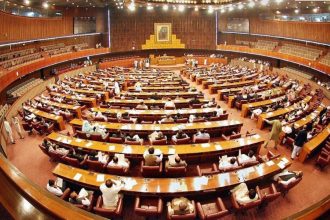“Pakistan is brimming with a rich historical and cultural heritage, with stories and artifacts that we are keen to preserve for future generations,” Google Asia Pacific Public Policy and Government Affairs Director Ann Lavin said on Thursday at a ceremony to unveil six online exhibits from Pakistan that have been added to the Google Cultural Institute platform.
The collections at the Lahore Museum, the Mohatta Palace Museum, the Walled City of Lahore Authority, the Heritage Foundation of Pakistan, the Fakir Khana Museum and the AAN Collection have been uploaded online to g.co/pakistanculture. The exhibit features more than 400 items and 12 special exhibits, including the rare Fasting Siddartha sculpture dated to 200 BCE and re-discovered in a 19th century excavation.
Participants at the ceremony were shown a documentary which mentioned that hosting the high-resolution pictures on Google – the largest search engine in the world – would boost Pakistan’s tourism industry.
In her speech after the documentary ended, Lavin said the Google Cultural Institute aimed to make the world’s heritage accessible for a global audience and to preserve it digitally for generations to come. “When technology mingles with art and culture, amazing things can happen.” The Google Cultural Institute, she said, was dedicated to creating technology that could help bring cultural treasures, archives, heritage sites, and related material to the worldwide web. Lavin said they were trying to increase the range and volume of material from the cultural world that is available for people to explore online and in doing so, democratise access to it and preserve it for future generations.
She thanked the institutions that had allowed the Google Cultural Institute access to their unique collections.
Google Cultural Institute Programme Manager James Davis said the six collections from Pakistan would highlight a wide range of artwork and cultural treasures that embodied the country’s unique heritage, from its Mughal era architecture to its modern day contemporary art.
He said under the new programme, Google would also add, for the first time, street view images in Pakistan. “This will make it possible for internet surfers to virtually wander through over 12 historical sites.”
Davis said the sites included fascinating streets of the Walled City as well. “As Lahore rapidly develops and with many of these older buildings in a condition of disrepair, the images provide a historic snapshot of 16th and 17th century Mughal era art and architecture.”
He said the Google Cultural Institute had been collaborating with art and cultural institutions in Asia since 2012.
When asked why Lahore was chosen by Google as the first site, among the South Asian countries, to exhibit its online collection, Lavin said, Because Lahore was the cultural hub of Pakistan and was as rich in culture and history as any other city in South Asia could possibly be.





